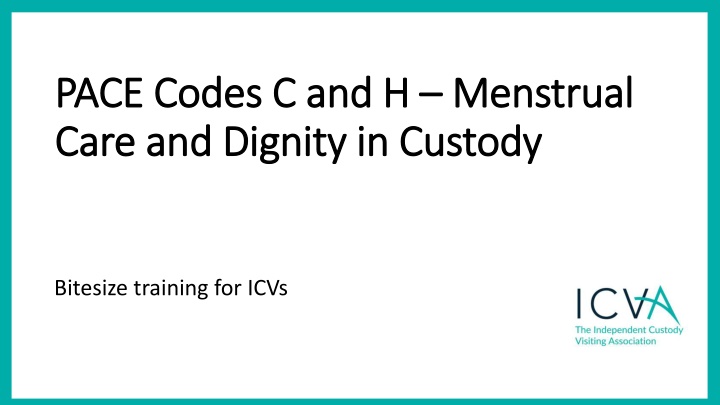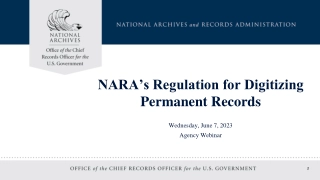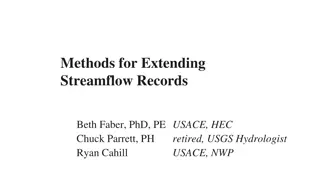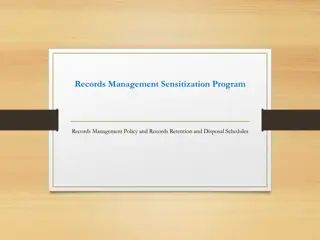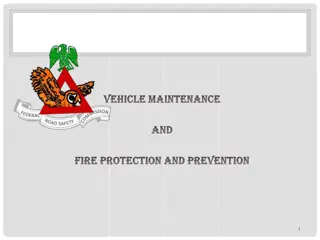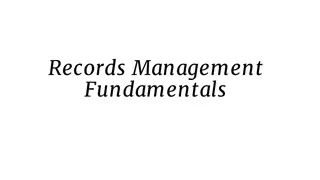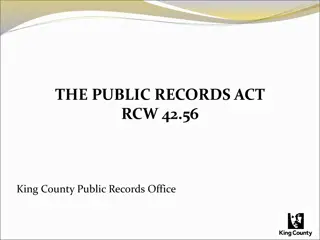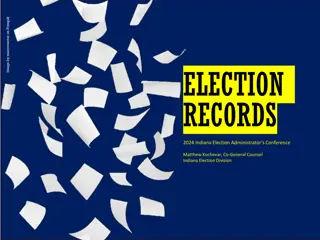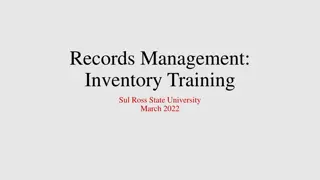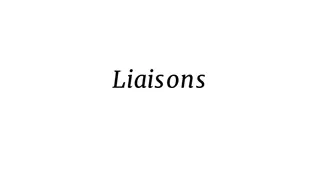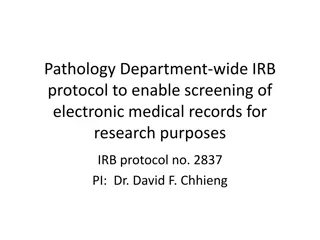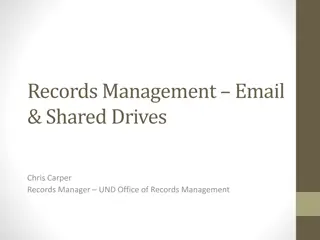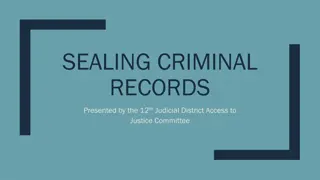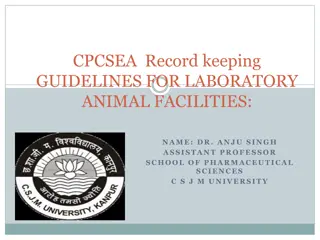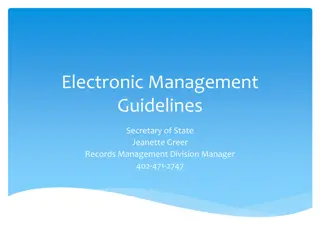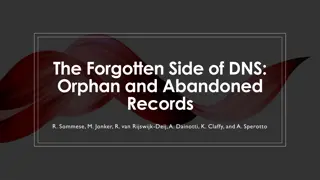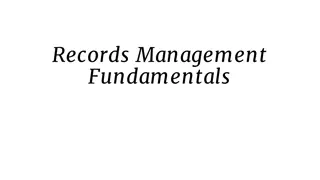Family Records Maintenance Best Practices
This session provides guidance on managing family Guardian records in student databases following family changes such as separations and marriages. Learn about adding name records, avoiding duplicates, and considerations for family maintenance.
Download Presentation

Please find below an Image/Link to download the presentation.
The content on the website is provided AS IS for your information and personal use only. It may not be sold, licensed, or shared on other websites without obtaining consent from the author.If you encounter any issues during the download, it is possible that the publisher has removed the file from their server.
You are allowed to download the files provided on this website for personal or commercial use, subject to the condition that they are used lawfully. All files are the property of their respective owners.
The content on the website is provided AS IS for your information and personal use only. It may not be sold, licensed, or shared on other websites without obtaining consent from the author.
E N D
Presentation Transcript
PACE Codes C and H PACE Codes C and H Menstrual Care and Dignity in Custody Care and Dignity in Custody Menstrual Bitesize training for ICVs
Objectives Objectives 1. To give context to changes in PACE Code C and H. 2. To look in detail at the changes made to PACE Code C and H in terms of menstrual care for detainees. 3. To examine the inclusion of dignity in PACE Code C and H. 4. To ensure ICVs are confident of what to monitor as per the changes to PACE Code C and H.
What is PACE Code C? What are the PACE Codes of Practice? PACE (Police and Criminal Evidence Act sets out to strike the balance between the powers of the police and the rights and freedoms of the public. What is PACE Code C? PACE Code C details the requirements of the police for the detention, treatment and questioning of suspects not related to terrorism in police custody. This is, therefore, the relevant Code to custody visiting.
Why has PACE Code C been updated? ICVs reported 2 cases of women being left without menstrual products, without their own clothes due to perceived risk of self harm. ICVA researched and surveyed all forces with assistance and support from the National Police Chiefs Council to establish supplies and arrangements for menstruating women. ICVA was offered pro-bono legal support to challenge the Home Office on inconsistent and poor arrangements for menstruating women and girls. The campaign was launched, and the then Home Secretary responded quickly stating that where effective provision was not put on a statutory footing she would ensure that it was. The Home Office worked with ICVA and other stakeholders to draft changes to the legislation, publicly consulted and announced the changes formally.
List of concerns As part of the call for change, ICVA compiled a list of concerns in this area, including but not limited to: Women and girls being proactively asked about their needs in terms of menstrual protection. Women having access to a female member of staff, (this is already in the legislation for girls in custody). Adequate hand washing facilities should be in place. Female detainees should be made aware that toilet areas are pixelated. Should a strip-search be required, sensitivity should be shown. Risk should be carefully considered, and removal of menstrual protection should be carefully risk assessed, with consideration given to higher levels of observation prior to the removal of any menstrual protection.
Changes to PACE Menstrual Care - 1 3.2 This is the section of PACE that details that rights and entitlements leaflets should be given to all detainees this section has been updated to include the following in the entitlements section: personal needs relating to health, hygiene and welfare concerning the provision of menstrual and any other health, hygiene and welfare products needed by the detainee in question and speaking about these in private to a member of the custody staff (see paragraphs 9.3A and 9.3B).
Changes to PACE - Menstrual Care - 2 3.5 This section deals with the booking in process and has been updated to state: (iia) wishes to speak in private with a member of the custody staff who may be of the same sex about any matter concerning their personal needs relating to health, hygiene and welfare (see paragraph 9.3A);
Changes to PACE - Menstrual Care - 3 3.20A This section has been updated to include: The Children and Young Persons Act 1933, section 31, requires that arrangements must be made for ensuring that a girl under the age of 18, while detained in a police station, is under the care of a woman. The custody officer must ensure that the woman under whose care the girl is, makes the enquiries and provides the information concerning personal needs relating to their health, hygiene and welfare described in paragraph 9.3A and menstrual products described in paragraph 9.3B
Changes to PACE - Menstrual Care - 4 4.3A This is the section concerned with detainees property and has been updated to include: For the purposes of paragraph 4.2, the reference to clothing and personal effects shall be treated as including menstrual and any other health, hygiene and welfare products needed by the detainee in question (see paragraphs 9.3A and 9.3B) and a decision to withhold any such products must be subject to a further specific risk assessment.
Changes to PACE - Menstrual Care - 6 9.3A This is the note earlier referred to in PACE. As soon as practicable after arrival at the police station, each detainee must be given an opportunity to speak in private with a member of the custody staff who if they wish, may be of the same sex as the detainee (see paragraph 1.13(c)), about any matter concerning the detainee s personal needs relating to their health, hygiene and welfare that might affect or concern them whilst in custody. If the detainee wishes to take this opportunity, the necessary arrangements shall be made as soon as practicable. In the case of a juvenile or vulnerable person, the appropriate adult must be involved in accordance with paragraph 3.17 and in the case of a girl under 18, see paragraph 3.20A. (See Note 9CB).
Changes to PACE - Menstrual Care - 5 9.3B Again, this is the further explanatory note referred to earlier in PACE. Each female detainee aged 18 or over shall be asked in private if possible and at the earliest opportunity, if they require or are likely to require any menstrual products whilst they are in custody. If they do, they must be told that they will be provided free of charge and that replacement products are available. At the custody officer s discretion, detainees may have menstrual products supplied by their family or friends at their expense (see Note 9CC). For girls under 18, see paragraph 3.20A.
Changes to PACE - Menstrual Care - 6 9CB Matters concerning personal needs to which paragraph 9.3A applies include any requirement for menstrual products, incontinence products and colostomy appliances, where these needs have not previously been identified (see paragraph 3.5(c)). It also enables adult women to speak in private to a female officer about their requirements for menstrual products if they decline to respond to the more direct enquiry envisaged under paragraph 9.3B. This contact should be facilitated at any time, where possible. 9CC Detailed guidance for police officers and staff concerning menstruating female detainees in police custody is included in the College of Policing Authorised Professional Practice (APP).
Changes to PACE Dignity - 1 Section 8 This is the section which details conditions of detention. This section has been updated to contain the following: 8.4 Access to toilet and washing facilities must be provided. This must take account of the dignity of the detainee, as appropriate. See Note 8D. 8.5 If it is necessary to remove a detainee s clothes for the purposes of investigation, for hygiene, health reasons or cleaning, removal shall be conducted with proper regard to the dignity, sensitivity and vulnerability of the detainee and replacement clothing of a reasonable standard of comfort and cleanliness shall be provided.
Changes to PACE Dignity - 2 Note 8D In cells subject to CCTV monitoring, privacy in the toilet area should be ensured by any appropriate means and if appropriate, detainees should be made aware of this when they are placed in the cell. If a detainee or appropriate adult on their behalf, expresses doubts about the effectiveness of the means used, reasonable steps should be taken to allay those doubts, for example, by explaining or demonstrating the means used.
What does the NPM say about the inclusion of dignity in PACE? In a recent article for the European Human Rights Law Review written by the NPM Chair and Co-Ordinator, it states: Though the issues raised by ICVA related specifically to the dignity of menstruating women, the proposed revisions could in fact have much wider application, citing dignity as a consideration in relation to access to toilet and washing facilities, cases where it is necessary to remove a detainee s clothing, intimate searches, and establishing the gender of detainees. This marks a major shift in tone in the text of these Codes, making it explicit that the detainee is worthy of dignified treatment .
What can ICVs look out for In the Suite Rights and Entitlements leaflets are detainees being given the most up to date copy, including the changes? Check and report if they are not! Stock does the suite have a good selection of products, individually wrapped and in date? Staff are the staff aware of and pro-actively offering women and girls in custody the chance to speak to a female member of staff? Staff are the staff aware that they need to pro-actively offer menstrual protection to all female detainees?
What can ICVs look out for From the Detainee Some suggestions of things you can ask the detainee: Has the detainee been offered a chance to speak to a member of staff of the same sex? Has the detainee been offered menstrual protection? Is the detainee aware that the toilet area is pixelated? Does the detainee report having been treated with dignity throughout their time in custody?
What can ICVs look out for From the Custody Record Does the custody record contain that a female detainee has been offered the opportunity to speak to a female member of staff? Has this discussion been offered to be private? Does the custody record state that menstrual protection has been offered and by whom? If the detainee requires and has been given menstrual protection, does the custody record note when replacement products have been offered?
Objectives Objectives a recap a recap 1. To give context to changes in PACE Code C and H. 2. To look in detail at the changes made to PACE Code C and H in terms of menstrual care for detainees. 3. To examine the inclusion of dignity in PACE Code C and H. 4. To ensure ICVs are confident of what to monitor as per the changes to PACE Code C and H.
